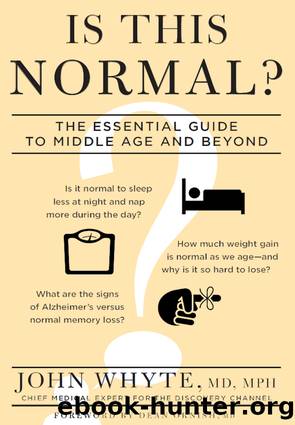Is This Normal? by John Whyte

Author:John Whyte
Language: eng
Format: epub
Publisher: Potter/Ten Speed/Harmony/Rodale
Published: 2011-08-14T16:00:00+00:00
Patients and caregivers often ask me about sleep medications. They typically want to know whether I will write a prescription for a sleep aid. Before I discuss any medications to help them sleep, I prefer to discuss medications they may already be taking that could be keeping them from sleeping. Often an existing medication is the culprit for an interrupted sleep cycle. There are numerous medications that impact sleep, including decongestants, antidepressants, antihistamines, some asthma medications such as theophylline and steroids, and even some heart medications such as beta-blockers. Believe it or not, sleeping pills can also make it difficult to sleep. It’s important to talk with your doctor about any current medications you’re taking before asking for a prescription sleep aid. Sometimes simply changing the time of day that you take your medicine, or changing the prescription, may be the answer you’re looking for.
Sleep aids do offer benefit for short-term use, but I discourage patients from using them. Medication can help, but it is not the only choice. Patients sometimes ask me about prescriptions that increase melatonin production, and there is some data to support melatonin as a sleep aid. The theory is that melatonin decreases as we age, and replacing it may help sleep. But again, medication should never be the first option. Behavioral therapy, lifestyle changes, and other nonpharmacological options can help many patients. Remember, problems with sleep as we age are usually due to some underlying medical condition or declining health status. It’s important to understand the reason for the difficulty in falling asleep and maintaining sleep, and treat any underlying medical problems. Many people who have difficulty falling asleep or staying asleep through the night head to their medicine cabinets for an over-the-counter remedy, such as one of the common pain relievers followed by the term “PM.” I don’t recommend taking these nonprescription sleep aids. Just like prescription medications, your body can become dependent on them. Also, medications such as Tylenol PM and Advil PM were not designed to help with sleep; their intended use is for the treatment of pain. If pain is causing sleep problems, treat the pain, not the insomnia.
Pain is a common reason people have difficulty sleeping. We feel that we just have to deal with the aches and pains of old age, but that’s not a good idea for numerous reasons. Among them is that it’s hard to get a restful night’s sleep if you are experiencing pain from a condition such as arthritis or osteoporosis. Be sure to take some type of pain reliever, such as a nonsteroidal anti-inflammatory drug or acetaminophen an hour or two before you go to bed, so you can have some pain relief before trying to fall asleep. Lack of pain management is a common reason older people may not sleep well.
Download
This site does not store any files on its server. We only index and link to content provided by other sites. Please contact the content providers to delete copyright contents if any and email us, we'll remove relevant links or contents immediately.
Effortless by Greg McKeown(1473)
Word Power Made Easy by Norman Lewis(1311)
How to Not Die Alone by Logan Ury(1303)
Beyond Order by Jordan B. Peterson;(1296)
So Good They Can't Ignore You by Cal Newport(1256)
The Power of 100! by Shaun King(1065)
Chatter by Ethan Kross(1061)
100 Things Successful People Do by Nigel Cumberland(1026)
Master of One by Jordan Raynor(1002)
Lives of the Stoics by Ryan Holiday & Stephen Hanselman(964)
Napolean Hill Collection by Napoleon Hill(940)
The High 5 Habit by Mel Robbins(935)
The Art and Science of Results by Joe Vitale(904)
Be Your Best Self by Mike Bayer(885)
Kinesic Magic by Donald Tyson(842)
Friday Forward by Robert Glazer(836)
Career Fear (and how to beat it) by Somi Arian(831)
The 7 Habits on the Go by Stephen R. Covey(821)
The Practice Is the Path by Tias Little(816)
